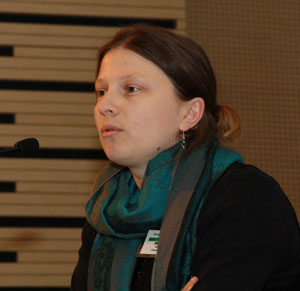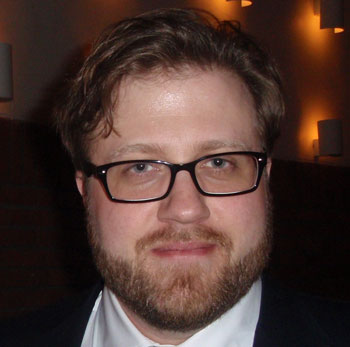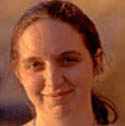| KEYNOTE SPEAKERS | ||
|---|---|---|
|
|
||
 |
 |
Emmanuelle Bermès is currently Project Manager for the Centre Pompidou virtual museum project. From 2003 to 2011, she worked at the National library of France, first in digital libraries, then in metadata management. She also worked as an expert within Europeana and contributed to design the Europeana Data Model. She is a member of IFLA IT section where she's contributing to the creation of a Semantic Web special interest group (SIG). Emmanuelle is a co-chair of the Library Linked Data W3C incubator group. Title: Towards Linked Data for Libraries, Archives and Museums Abstract: Convergence is a major issue for cultural heritage organisations: libraries, archives and museums face the growing need to provide their users with seamless access to their data. This challenge is not new, and the Dublin Core initiative was born to create interoperability by using technologies and processes designed for the Web. Today, the growing interest of our community in Linked Data and Semantic Web technologies raises many questions. Is this new technology the solution for a problem that we know has existed for years, even decades? Is the community ready to invest the time, budgets, mind changes that are required to adopt Linked Data ? Without ignoring these issues, current implementations can demonstrate the need for such a change, and reveal the key features of Linked Data that could be success factors for its adoption in the cultural heritage domain. |
|
|
||
 |
 |
Mikael Nilsson is currently a Software Engineer at Google. He recently published his PhD thesis on metadata harmonization at the Royal institute of Technology in Stockholm, summarizing his experience of making standards work together over the last decade. He is an active participation in numerous metadata standardization activities, nurturing the vision of making them all be useful in a common metadata ecosystem. Mikael is currently the co-moderator of the DCMI Architecture forum and chair of the DCMI/IEEE LTSC joint task force, and has co-edited a number of DCMI specifications, such as the DCMI Abstract Model and the DCMI RDF expression. He has been one driving force behind the formulation of the DCMI Singapore Framework for application profiles. Title: Metadata Harmonization for Fun and Profit Abstract: Common wisdom tells us that metadata nirvana can only be achieved through widespread use of a single metadata standard. At the same time, the world is moving in the opposite direction, with new metadata schemas and formats showing up at an seemingly alarming rate. But metadata diversity can be a good thing, as long as a basic level of harmonization is maintained. The question is: what is metadata harmonization and why should we care? The talk is an exposition of the core concepts in the speaker's PhD thesis "From Interoperability to Harmonization in Metadata Standardization". |
|
|
||
| TUTORIAL PRESENTERS | ||
|
|
||
 |
 |
Stephanie Taylor has over fifteen years experience as an information professional, workshop facilitator and trainer. She is currently running the Metadata Forum for UKOLN, a centre of excellence in digital information management, based at the University of Bath. The Forum is a JISC-funded initiative which aims to build a community of practice around the practical application of metadata in UK HEIs. She likes to work in areas where others fear to tread, and has, accordingly, developed interests in electronic copyright, resource sharing, institutional repositories and metadata. |
|
|
||
 |
 |
Paul Hermans is the lead architect of Erfgoedplus.be ('heritage-plus'), a Belgian project aimed at disclosing all types of heritage from the provinces of Limburg and Flemish Brabant and the city of Leuven to the public by applying semantic web technology. Erfgoedplus.be uses RDF/XML, OWL and SKOS to describe relationships to heritage types, concepts, objects, people, place and time. He is the technical architect and developer of the Dublin Core based metadata standard of the Dutch Government, OWMS, and of the Linked Data publication of the related vocabularies. Paul has been chairman of the Belgian-Luxembourgian SGML/XML User's Group for years and he is a fellow of the Hogenheuvelcollege KULeuven, research group Informatics (LIRIS). |
|
|
||
 |
 |
Antoine Issac works as scientific coordinator for Europeana and researcher in the Web an Media group at the Vrije Universiteit Amsterdam. He has been investigating and promoting the use of Semantic Web technology in the Cultural Heritage environment since his PhD studies in Computer Science at the Université Paris IV Sorbonne and the Institut national de l'audiovisuel. His work focuses especially on the representation and interoperability of collections and their vocabularies (STITCH, TELplus and EuropeanaConnect projects). He has been a member of the W3C Semantic Web Deployment Working Group, where he was mostly involved in the design of SKOS. He is currently serving as co-chair of the W3C Library Linked Data incubator group and SKOS community contact. Read more at http://www.few.vu.nl/~aisaac. |
|
|
||
 |
 |
Emma Tonkin works as Technical Innovation Coordinator at UKOLN, the University of Bath. Originally educated as a physicist, she discovered an interest in human-computer interaction and has worked around technology and the Web ever since, continuing her studies at the University of Bristol. At UKOLN, she is currently working on a number of JISC-funded projects, including: metadata authoring tools; repository registries; palaeoclimate data management; low-cost pervasive computing; and text analysis. Emma is a co-moderator of the Dublin Core Registry community and task group, and the Dublin Core Social Tagging interest group. |
|
|
||
![]() DCMI's work is supported, promoted and improved by « Member organizations » around the world:
DCMI's work is supported, promoted and improved by « Member organizations » around the world:
 |  |  |
 |  |  |
 |  |  |
 |  |  |
 |
![]() DCMI's annual meeting and conference addresses models, technologies and applications of metadata
DCMI's annual meeting and conference addresses models, technologies and applications of metadata


